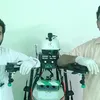Bharat Biotech, US university tie up for COVID-19 vaccine
Vector used in new COVID-19 vaccine is a deactivated rabies vaccine known to produce a strong immune response; it has been proven safe for all populations, including children and pregnant women.
Vaccine innovator Bharat Biotech and Thomas Jefferson University of Philadelphia have signed an exclusive deal to develop a new vaccine candidate for COVID-19 invented at Jefferson.
The novel vaccine was developed using an existing deactivated rabies vaccine as a vehicle for coronavirus proteins.This vehicle, or carrier vaccine, is known to produce a strong immune response and is approved for the entire population, including children and pregnant women.
Infectious diseases expert Professor Matthias Schnell’s lab developed the vaccine in January this year. Preliminary tests on animals have been completed; the vaccine showed a strong antibody response in mice.
The researchers are currently testing whether vaccinated animals are protected from SARS-CoV-2 infection, with results expected in the next month.

“Our partnership with Bharat Biotech will accelerate our vaccine candidate through the next phases of development,” said Prof Schnell, a coronavirus expert who directs the Jefferson Vaccine Institute and chairs Jefferson’s Department of Microbiology and Immunology.
“We will be able to complete animal testing and move to phase 1 clinical trial rapidly,” he added.
Dr Krishna Mohan, Chief Executive Officer, Bharat Biotech, said, “In view of the imminent demand for an effective vaccine, Bharat Biotech is pleased to collaborate with Thomas Jefferson, US, towards developing a new vaccine for COVID-19 using an inactivated rabies vector platform. We are particularly excited about this technology since the basic proof of concept has been established while using it for other pandemic infectious diseases. Bharat Biotech is committed to global public health and will be involved in end-to-end development of the vaccine, including comprehensive clinical trials to achieve commercial licensure."
Under the licence agreement, Bharat Biotech gains exclusive rights to develop, market, and deliver Jefferson’s vaccine across the world, excluding countries such as the US and Japan and in Europe, where Jefferson continues to seek partners.
With support from the Department of Biotechnology, Bharat Biotech aims to get into human trials as soon as December 2020.
“Bharat Biotech is the world’s largest supplier of rabies vaccines, and has been at the forefront of creating breakthrough vaccines for several challenging diseases,” said D. Rose Ritts, Jefferson’s Innovation Executive Vice President, who led negotiations with the assistance of Dr Heather Rose, Innovation Vice President.“They are the right partner for Jefferson to accelerate this important project with urgency,” he added.
Reworking the rabies vaccine
Of the 90 or so coronavirus vaccines in development, about 25 percent use an established vaccine to act as a “carrier” or vector for the target virus, in this case, the coronavirus SARS-COV-2 spike protein.
Not every vaccine produces the same level of the immune response.The rabies vaccine has been shown to generate a rigorous but safe immune reaction that confers life-long protection.
“Since we know the immune system reacts to the rabies vaccine with a strong response when we add the coronavirus component, we expect to see that level of protection, and immune memory, carry over to the SARS-CoV-2 viral protein as well,” says Prof Schnell.
Prof Schnell’s prior research creating vaccines with this approach against two other strains of coronavirus (the 2003 SARS and 2012 MERS viruses), worked in this way, conferring strong immunity in animal models.
“We are leveraging the properties of a very effective vaccine – one that provides life-long immunity against one of the biggest global threats of our time,” said Dr Mark Tykocinski MD, Provost and Executive Vice President for Academic Affairs at Thomas Jefferson University, and Dean of its Sidney Kimmel Medical College.
“Rather than go with an untested approach, we have a leg-up by using a vaccine that is safe, effective, and exceptionally good at creating a strong immune response – which is something not every vaccine can do.”
Edited by Javed Gaihlot








